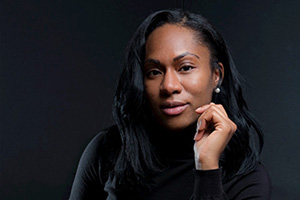- Apply
- Visit
- Request Info
- Give
City of New Haven arts director speaks on advancing equity, diversity in the arts
Written by Bobbi Brown
Published on February 15, 2021

Adriane Jefferson, executive director of the Department of Cultural Affairs for the City of New Haven
Due to the efforts of Adriane Jefferson, executive director of the Department of Cultural Affairs for the City of New Haven, the arts and cultural institutions in that city are becoming more diverse and equitable. Jefferson shared some of the city’s innovative developments with Eastern Connecticut State University during a University Hour lecture on Feb. 10.
Jefferson began by saying her topic was about “anti-racism and the role the arts can play with dismantling systems.” She said that while many people view the arts as being progressive and liberal, racism does exist in the arts. “This has really been my mandate to be at the forefront of a movement within the arts,” said Jefferson, “that is propelling a narrative that is about justice, equity and culture, and making sure everyone feels included.”
To illustrate how Black and Brown people are depicted on screen, Jefferson showed a video on housing segregation titled “Housing Segregation and Redlining in America: A Short History.”
“We must first understand the role that arts have played in harming people. We must understand that the arts in our history have often come from a colonized and westernized point of view,” stated Jefferson. “We really need to come to grips with what our history in the arts is that has been applied to advancing racism and we have to be truthful about it.”
Jefferson defined cultural equity as a means “to break down barriers and develop access points for people who typically do not have access points. In order to really achieve true cultural equity, we need to also address the inequities that are in people’s lives every day.” Those inequalities include lack of access to transportation, healthcare, employment, finances and childcare. “If these systems are creating barriers, then you better believe it’s going to create barriers in the arts.”
Jefferson also pointed to that fact that arts programs are often the first to get cut when a school is undergoing financial issues. “In certain circumstances the arts seem like a privileged thing to have in our history,” said Jefferson in talking about the lack of resources some schools have.
Jefferson concluded her presentation by describing the projects, initiatives and resources she and her department has accomplished. Working closely with New Haven’s mayor, Jefferson has helped to create a racial equity plan for the City of New Haven. Jefferson’s department has also established the New Haven Creates Relief Fund, which raised almost $300,000 in a month to help low-income artists pay their rent, bills and other obligations. Jefferson and her team also created the “Arts for Anti-Racism Pledge” (https://www.togethernewhaven.com/pledge), which commits organizations to address and implement racial justice.
Eastern’s University Hour takes place Wednesdays from 3-4 p.m. To view the semester’s University Hour schedule, visit https://www.easternct.edu/university-hour/index.html.


